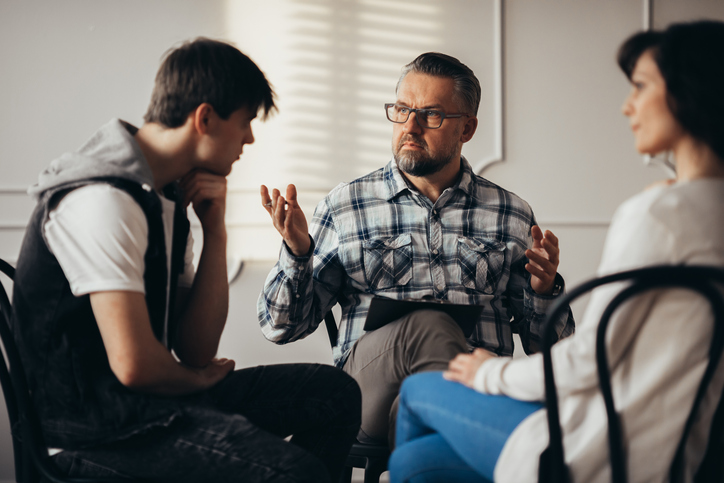While the symptoms may only be present within an individual, it’s often said that addiction is a family disease (Murry, 2022). One family member’s addiction will likely affect the family unit as a whole, and genetics, generational trauma, unresolved resentment and tension within the family can all play a significant role in shaping a person’s substance use disorder (Murray, 2022). With family therapy, harmful family dynamics are addressed, and family members can work together to repair relationships and determine the best means for support for their loved one (American Addiction Centers, 2022).
If you’re seeking a career as an addictions counsellor, you’ll be leading sessions with individuals suffering from substance use disorders, group sessions, and family sessions. With training in Motivational Interviewing and other techniques at Rhodes Wellness College, you’ll be prepared to empower your clients to achieve sobriety with the support of their families. Below, discover a guide to family therapy for substance use disorders and some tips and practices for success.
Why Family Counselling is Important
Family counselling sessions can offer a number of benefits to those suffering from a substance use disorder and their loved ones. For family members, having a loved one with a substance use disorder can be a traumatic experience. Addiction changes an individual’s behaviour, brain chemistry and relationships, which can take a significant emotional toll on those they are closest with (Canadian Centre for Addictions Admin, 2020). Thus, for family members, family counselling can be an important tool for communication and healing, helping to cultivate understanding (Canadian Centre for Addictions Admin, 2020).
Addiction can also feel like an individual and isolating experience, resulting in the individual withdrawing from their family. With addictions counselling training, you can lead family sessions to help them see that they are cared for and loved and are not alone in their difficult situation (Addiction Rehab Toronto, 2021).
What Family Counselling Can Offer for Families
Family counselling sessions are unique in their ability to provide a safe space for family members to raise their concerns, emotions and other thoughts that they have been holding back (Addiction Rehab Toronto, 2021). Family counselling is also an opportunity for family members to gain helpful information about addiction, its impact, and the best ways to promote the recovery of their loved one. Through family counselling sessions, professionals with an addiction counsellor diploma can teach family members about the best actions to take to support their loved ones, including avoiding enabling, taking care of themselves and maintaining realistic expectations throughout the counselling process (TriHealth, 2013).
Additionally, there are several different types of family counselling, which may be selected depending on the needs of the family in question. One is Systemic, which focuses on underlying communication and interpretation of actions, where a counsellor may take a more hands-off approach to the session (Murray, 2022). Another, Bowenian therapy, works for individuals who want to avoid their family getting involved in their healing process (Murray, 2022). Structural therapy is best for younger sufferers of addiction, reinforcing the family dynamic and the authority of the parents (Murray, 2022). Finally, Strategic counselling involves equipping each family member with strategies and tools.
Practices to Employ in Family Therapy After Addictions Counsellor Training
When it comes to running a family counselling session as an addictions counsellor, there are a number of different practices which can be employed to facilitate a better connection between family members. As a counsellor, not only will you be observing family dynamics, but you’ll also be developing solutions for improvement, which may include:
- Role-playing; helps to enhance empathy
- Letter writing or journaling; assists family members in saying things they can’t say out loud
- Practicing communication techniques; help to improve communication
- Cognitive behavioural therapy; helps to regulate and recognize behaviours and emotions
The above practices can help family members to restore understanding and identify new ways to relate to one another (Murray, 2022). With an improved family dynamic, an individual may find the support they need to recover while helping other family members to heal from their trauma.
Are you searching for addictions counselling training in Vancouver?
Contact Rhodes Wellness College for more information today!
Works Cited:
Addiction Rehab Toronto. (2021, February 3). Does family counselling for addiction work? Addiction Rehab Toronto. Retrieved September 20, 2022, from https://addictionrehabtoronto.ca/family-counselling-addiction-work/
American Addiction Centers. (2022, July 14). Types of therapy for addiction. Desert Hope. Retrieved September 20, 2022, from https://deserthopetreatment.com/las-vegas-program/therapy-types/
Canadian Centre for Addictions Admin. (2020, January 24). Help for those supporting an addicted loved one. Canadian Centre for Addictions. Retrieved September 20, 2022, from https://canadiancentreforaddictions.org/help-for-those-supporting-an-addicted-loved-one/
Murray, K. (2022, September 14). Family therapy. Addiction Center. Retrieved September 20, 2022, from https://www.addictioncenter.com/treatment/family-therapy/
TriHealth. (2013). 7 Tips for Helping Someone with an Addiction. TriHealth. Retrieved September 20, 2022, from https://www.trihealth.com/dailyhealthwire/wellness-and-fitness/7-tips-for-helping-someone-with-an-addiction











